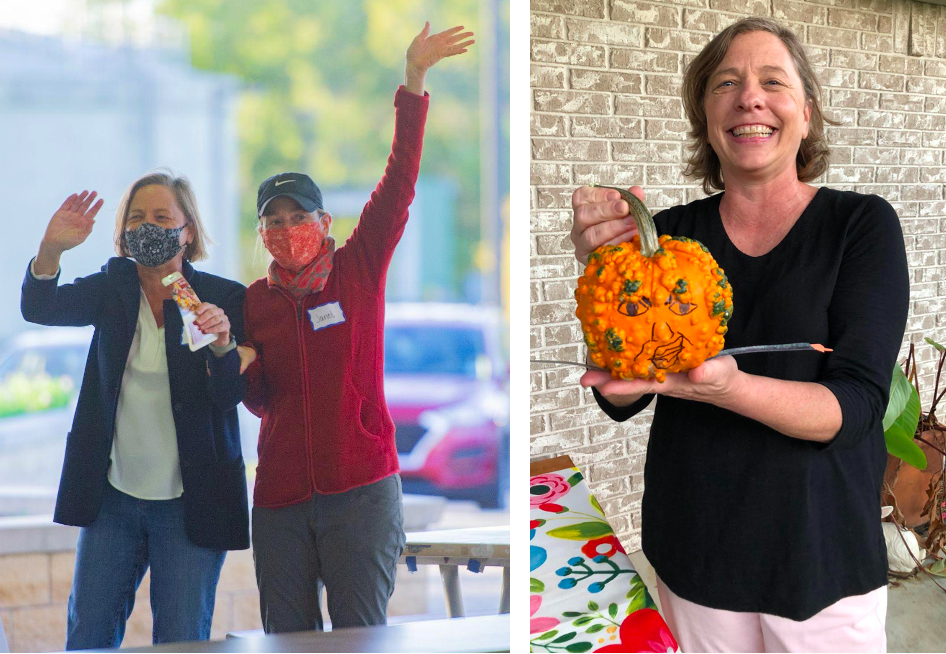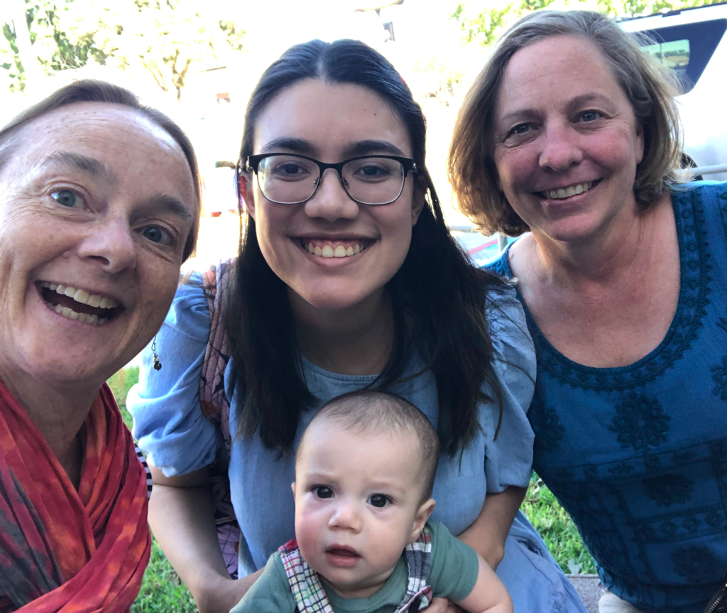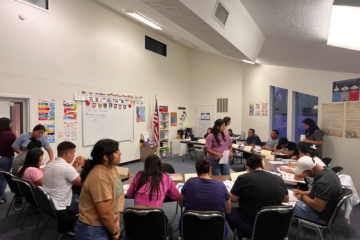Shared stories: colleagues reflect on overlapping periods of service to BIIN
Published by Program Manager on
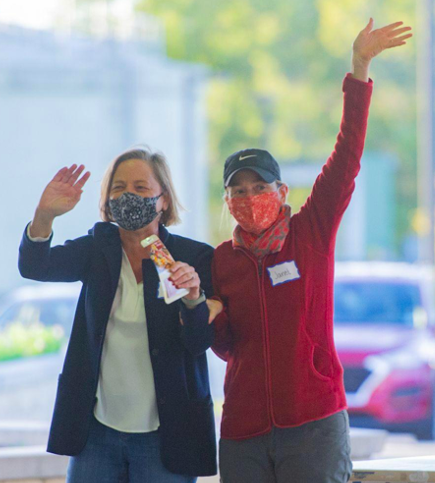
Shared stories: colleagues reflect on overlapping periods of service to BIIN

You know the lyrics, “There is a season, turn, turn, turn…” BIIN is turning a page this season, and as the organization adapts to some significant changes in the composition of its staff, we wanted to turn the mic to the two people who are stepping down: Jaimi Washburn, outgoing Director, and Janet Morford, who will also wrap up her term as Communications and Development Coordinator this fall.
Jaimi and Janet have worked closely together on everything from supervising interns to cleaning the office spaces, from writing grants to making pitches to donors and community partners. Collaborating once more, they agreed to share their perspectives on their overlapping periods of service to BIIN, in hopes that by looking back on their experience, they may offer some helpful history and insights for those who step in and recommit to moving the organization forward.
When and how did you first come to work at BIIN?
Jaimi: My husband and I moved to College Station in 2016, after he took a job at TAMU. A few months after we arrived, I tried to volunteer at BIIN but never got a reply to my emails or phone calls. Then my husband met with Mary Campbell, the vice chair of the BIIN board at the time, about a grant opportunity; she mentioned that BIIN was hiring a program manager and recommended that I apply for the position. I had just started graduate school full-time as a non-traditional student and was not sure if I could handle a part-time job on top of grad school, but I decided to meet with the hiring committee. After learning more about BIIN’s work, I decided to accept the position and I began working in February of 2018.
At that time, BIIN already had a part-time IRA coordinator (Raul Dominguez-Cruz). We then hired a few more part-time staff, including our website and database manager (Adriana Stowe), a short-term volunteer and office manager (José Morales), and then you, Janet, all in early 2020. With this expansion of staff, the board changed my title to “Director” in September 2020.
What about you? What’s your story of coming to BIIN?
Janet: Like you, I came to live in College Station – in 2017 – after my husband had taken a job at TAMU. At the time, I was still helping to finish an audio documentary that my former students in Illinois and I were producing, and I wasn’t seeking a new job immediately. But being new to the B/CS area, I wanted to find kindred spirits. I became involved at St. Thomas Episcopal Church (one of BIIN’s long-time community partners), and started to volunteer with the “English for Parents” program at Neal Elementary – where through Mary Lenn Dixon and other volunteers, I learned about BIIN. I met you, Jaimi, in 2018, when I stepped up to help lead “English for Parents” along with Linda Ford. I still remember how friendly and outgoing you were from the very first moment! Then in May 2019, we reconnected when you asked if I would make a presentation at the BIIN Gala, and I partnered with Maria Rodriguez, one of the program participants, to help tell her story and experience with BIIN.
In February 2020, I told you that I was looking for a new way to volunteer with BIIN. At that point, you had a heavy course load for grad school, plus BIIN had taken on 11 interns for the semester. You needed help supervising interns, and in particular, someone to create a more rigorous process of collecting clients’ stories, so that BIIN could better illustrate the impact of its programs in the lives of local immigrants. This really appealed to me, given my experience in interviewing people to tell stories about the work of nonprofit organizations, mentoring young people and working with immigrants through the “English for Parents” program. You and Mary Campbell, then board chair, proposed that I join the staff part-time, in a role that we initially called “Consultant for Special Projects,” for lack of a better term!
Then, just weeks later, in March 2020, the coronavirus pandemic spread and lockdowns began. Like everyone else, BIIN had to pivot and change the way it did many things, including programs, communications, development, and working with interns and volunteers. In that context, my role was redefined as “Communications and Development Coordinator,” and that’s what I’ve done ever since. So we’ve worked closely together for over two and half years, sharing responsibility for many successive cohorts of interns, working with Adriana, José and all of the program and board leaders to adapt to the changes necessitated by the pandemic, and doing everything we could to keep BIIN going in terms of operations and finances during these challenging times. I’ve always been deeply grateful for your collegiality and your commitment to teamwork.
You’ve been here longer than I have and had a broader range of responsibility. Thinking back over your time at BIIN, what are the areas or initiatives that you have been most deeply invested in?
Jaimi: There were several projects that I have really put a lot of energy into:
One of my first projects was investing in the volunteer program. I presumed there were other people in the community (like me) that wanted to help BIIN but perhaps their volunteer inquiries were unanswered. Since I was the only staff member at first and working only part-time, I knew there was no way I could respond to everyone on my own. I decided to use an online volunteer management system that allowed volunteers to easily sign themselves up for volunteer shifts and did not require a lot of administrative time. I then had to write volunteer job descriptions, develop a volunteer handbook and FAQ’s, put the volunteer sign up calendar on the website, recruit volunteers, create a volunteer appreciation plan, etc.
Seeing the many advantages of having more people to help manage programs and specific aspects of operations, I also worked to expand BIIN’s internships. I researched different classes at TAMU that offered class credit for internships. I created job descriptions for specific intern roles at BIIN, and reached out to faculty members, letting them know about the new positions and sending them a flyer to share with their students. Then each semester, I would interview, recruit and train the new set of interns. When we had a bumper crop in spring 2020, it was great to have you join me in shouldering that responsibility!
The volunteer program could still use some improvement but I am happy that people can go to our website, read about the volunteer or intern opportunities, and sign up or apply. BIIN interns and volunteers have continued to bring incredible skills and value to the organization’s work!
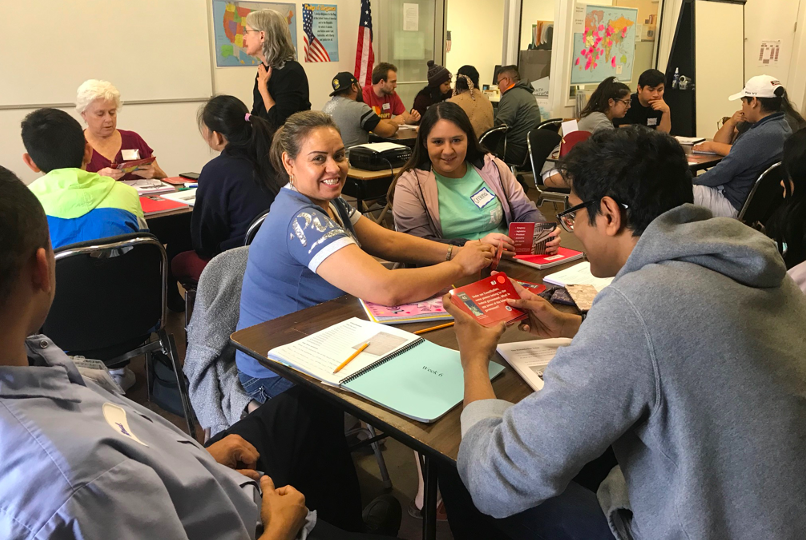
The risk management plan was another huge endeavor. After a board retreat in 2019, the group decided that creating a risk management plan for the organization was a priority. I worked with committee members and developed a risk management plan that included creating a lot of policies and documents: conflict of interest policy, non-disclosure agreement, job descriptions for the board of directors, board orientation, a new board member packet, board assessment, employment policies, performance appraisal, fiscal safeguard policy, and an emergency plan.
Finally, there was the whole Salesforce project. BIIN used to have six disparate databases that made it very difficult and time consuming to extract and compare information from different programs to show the organization’s impact. What we needed was one platform where all of this data could be kept, easily accessed and cross-referenced. After a lot of research, an intern working with me on this task, Cate Stackhouse, discovered that Salesforce offered 10 free user licenses to nonprofits. This meant that its database would be within reach for BIIN.
Salesforce can do amazing things but the database needs to be configured by people that know what they are doing. Bids from certified Salesforce consultants to do this configuration work were coming in anywhere from $40K to $75K, which BIIN could not afford. After much research, I found a consultant who could help us configure the platform for $2,500, and we hired her. She had a lot of experience building out the fundraising part of the database, but not so much customizing and using Salesforce’s nonprofit apps. It took us – the hired consultant, Adriana, and me – a lot of time to understand how to use Salesforce for our purposes, to find help in answering questions, fixing issues, etc.
However, I’m excited to say that after many, many grueling hours of research, much frustration, and many tears, BIIN can now efficiently track all information related to donations, volunteers, programs, students, events, grants, and texting on ONE platform: Salesforce. There are still a few tweaks that need to be made but I am thrilled to see this project to completion. I honestly did not think that everything we wanted from the database would be completed by the time I stepped down from BIIN’s staff.

What about for you, Janet? What are the projects that you have been most deeply invested in during your time at BIIN?
Janet: I have put a lot of time and effort into interviewing people who participate in BIIN’s programs, and using those interviews to create profiles of individuals and programs for various platforms: the website and newsletter, social media posts, fundraising campaigns, and donor communications. At the same time, I taught many interns how to conduct and record interviews, transcribe and use them to tell stories about BIIN and its impact in the community. It was particularly rewarding for me to help interns develop these skills and learn how to craft narratives that center immigrants’ voices while also telling the story of BIIN as an organization. I am proud of the rich archive of “Immigrant Stories” that we have created, including the short video produced with interns Sofia Montes and Amanda Ramirez in spring 2021.
I have also enjoyed creating other kinds of content for the BIIN website and newsletter, and in this regard, have loved interviewing people involved in many different programs and community partners, and collaborating with our uber-competent colleague Adriana Stowe, who works wonders behind the scenes!
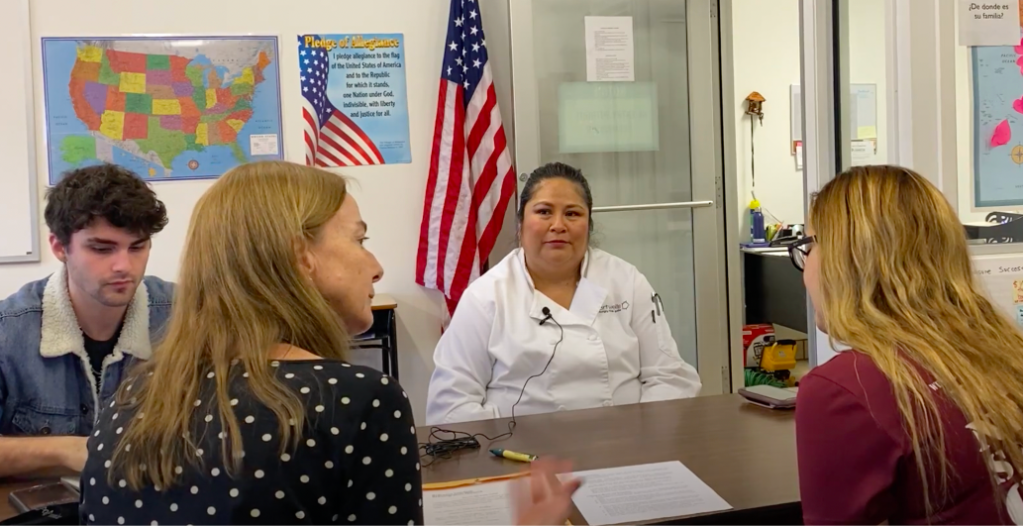
Another sustained focus for me has been mentoring interns assigned to different programs and areas of operations, including the English and IRA programs, marketing and communications, and grant writing. Whether we worked remotely or in person, I have loved getting to know each of the interns I’ve supervised. While I’m still a teacher at heart, I have learned just as much from these talented young people, especially when it comes to using digital tools. I particularly enjoyed collaborating with interns and volunteers to create and launch the “Allies in Action” program, which offered instruction in basic digital tools along with practice in English, in a family-friendly format. I have likewise enjoyed working with program leaders, volunteers and participants involved in all of BIIN’s English programs, and I love being in BIIN’s classes to see the connections that students and volunteers develop as they work together.
Finally, I have invested a great deal in grant writing for BIIN, working closely with you, Jaimi, as well as with occasional interns and volunteers, to expand support for our programs and operations from private foundations and other corporate donors. Crafting clear and compelling grant proposals on behalf of a nonprofit organization is a skill that takes time and practice to hone, but I think that having deep familiarity with BIIN’s programs and services, as we do, makes it easier. It also helps to have a committed crew of folks who can help with identifying funding opportunities, gathering information, developing budgets, offering feedback on drafts, presentations, and so on. It really takes a team to do this well, and I am proud of the steady increase in the support that BIIN has received through grants and other external funding as we have worked on these initiatives together.
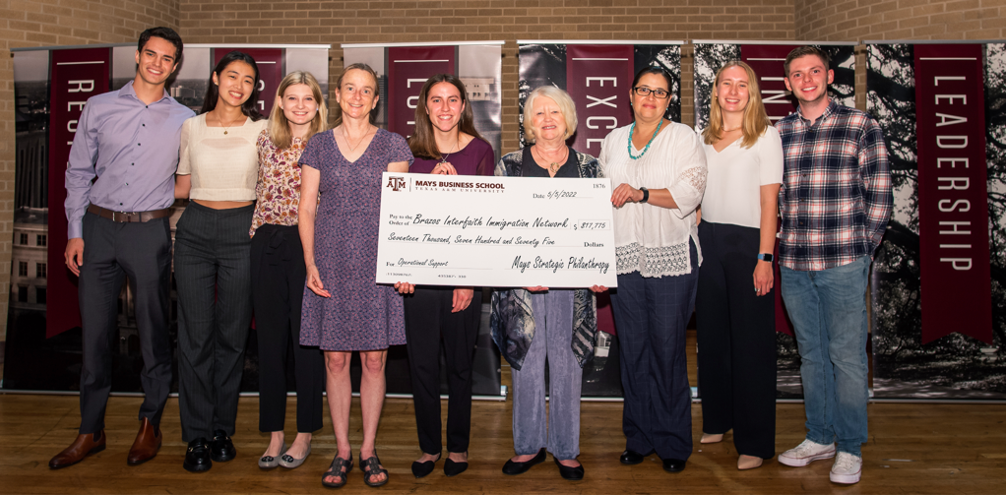
As you think back over your work with BIIN, what has been most significant for the organization and/or most rewarding for you?
Jaimi: I think getting Salesforce up and running was the biggest challenge and will have the longest, most significant impact on the organization. As much as I hated working on the project for almost a year, it gives me a terrific feeling of satisfaction knowing that it has been configured, launched, and is now in use. It has so much functionality – I hope someone will build upon what is set up now and make it even better.
From your perspective, what has been most significant for the organization and/or for you?
Janet: I am really proud of the ways that BIIN responded to the pandemic: by offering new forms of support to immigrant neighbors in need (the BIIN CARES Fund, Línea Amiga, vaccination campaigns, etc.), and adapting our programs and services in ways designed to keep people safe while also teaching new skills. Moving programs and operations online was hard at first, but it really helped many folks, by teaching all of us some new skills. By expanding online fundraising and successful grant writing, and realizing that not all tasks can reliably be done by volunteers, BIIN has also been able to gradually increase the organization’s annual budget over the past few years. That’s a trend that I hope will continue. Although the pandemic and associated disruptions brought many changes to our operations, BIIN as an organization has managed to learn and to grow from these challenges, and I see this as extremely positive.
As for me personally, I have learned much more about what it takes for nonprofit organizations to work. I now know that it requires clear procedures and policies; staff who are fairly compensated as well as a board committed to fiscal responsibility; steady sources of funding and support from the wider community as well as good will from occasional volunteers and people committed for the long haul.
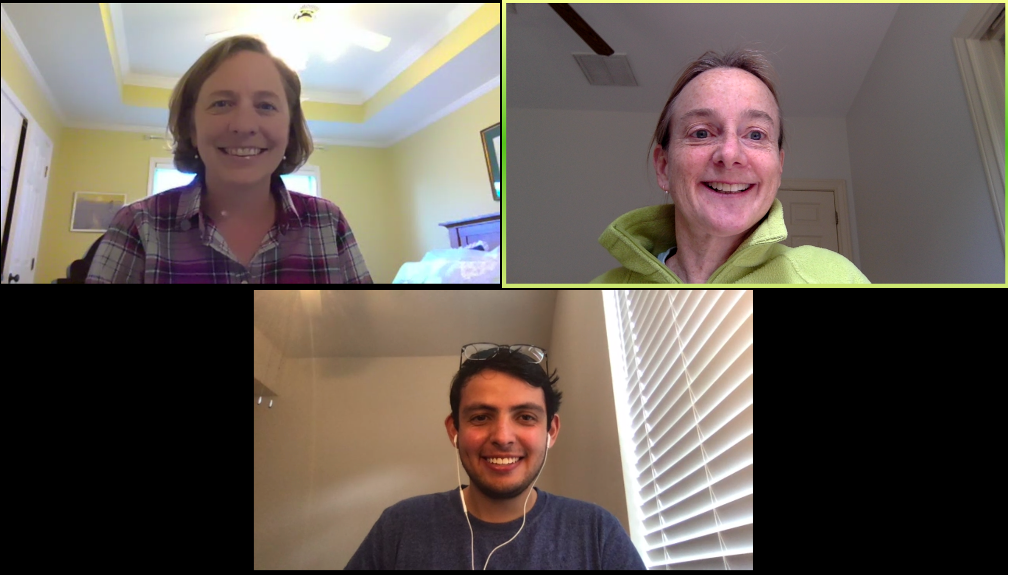
As you move on to a new chapter, what do you leave to those who will pick up the mantle, and what do you wish for the organization as a whole?
Jaimi: I hope that I have done a good job of facilitating the transition and that all of the training documents and videos I created are read and useful. I know that the AmeriCorps members, Tania Barrios and Viviana Castillo, will be a huge help when the new director, Vannessa Rivera, begins. It would be great for BIIN if the organization could continue to get AmeriCorps members annually. I would love to see the organization invest the time to utilize more of Salesforce’s automations and to develop reports, so that nuanced data can be used to help guide decisions. I really hope that BIIN continues to serve even more immigrants, that our IRA program expands its capacity to serve immigrant neighbors in need, that BIIN brings more mobile consulates to Bryan, and gets more community support through donations and volunteer involvement.
What are your hopes for the organization, moving forward?
Janet: I hope that under the leadership of the new board, there will be productive reflection about how to ensure BIIN’s sustainability: its financial health, the programs and services that it offers, and its responsibility to staff as well as to clients. Thanks to contributions from many people and community partners, BIIN has managed to do a great deal of good in its first dozen years. I hope that its leaders and supporters, participants and partners, will seize the next decade to deepen and extend the organization’s impact. I believe that all who take part in its programs, all who work, volunteer, or donate to support BIIN’s mission, will find here an affirmation of their inherent dignity as human beings. That’s been my experience. And I hope that the organization will continue to find the support it needs and deserves from the local community and beyond. From my own involvement, I know the immeasurable good that BIIN does in this community, and I will continue to support its efforts as a volunteer and donor. Yet I recognize that it is time for others to step into the roles that you and I have had at BIIN, and I wish them well.
I’m really going to miss you, Jaimi, but I am so grateful for all that you and everyone else at BIIN has taught me, and for that, I say thank you!
